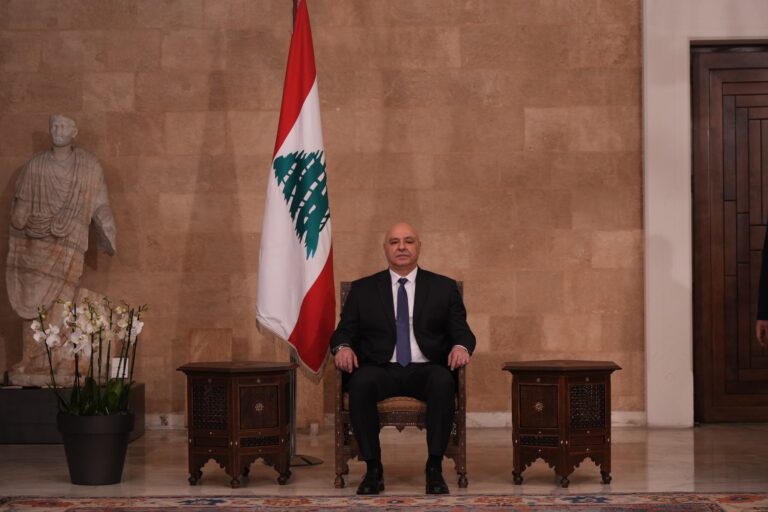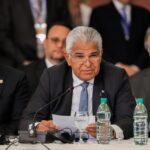President Joseph Aoun’s election is seen as a hopeful step towards recovery and reconstruction in Lebanon, with both domestic and international support bolstering prospects for positive change. Lebanon’s parliament elected a long overdue president after a two-year vacuum, ushering in hope for rebuilding the war-torn country while revealing a new balance of power within the internal political scene.
Hezbollah and the Amal Movement – often referred to in Lebanon as the Shia duo – both ended up voting for army commander Joseph Aoun as president, even though they had been fiercely opposed to his candidacy in the past.
Presidential elections, like all major decisions in Lebanon, need consensus. Major factions come to an agreement behind the scenes, and it is only then that a president is elected by the Parliament.
National consensus is the cornerstone of Lebanon’s sectarian-based power-sharing system, which has proven to be dysfunctional at times often leading to political gridlock, as was the case with the presidential vacuum since the end of 2022.
“Regional shifts, growing domestic discontent, and the need for international legitimacy have constrained their influence, pushing them toward accommodation rather than confrontation.
Hezbollah’s military capabilities and manpower were dealt a severe blow during its almost 13-month war with Israel that ended in November 2024, which, along with the fall of the Assad regime in Syria, has incapacitated the Iran-backed Axis of Resistance.
Voting for Aoun reflects a shift in the internal balance of power.
1. Strategic Diplomacy with Hezbollah
- Neutral Stance on Resistance: Aoun is likely to adopt a pragmatic approach. While he has historically emphasized the need for the Lebanese state to maintain a monopoly on arms, he may avoid direct confrontation with Hezbollah to prevent destabilization.
- Focus on Security Cooperation: As the former commander of the Lebanese Armed Forces (LAF), Aoun has worked alongside Hezbollah on national security issues in the past. This collaboration could continue in areas such as border security and counterterrorism, albeit with efforts to reinforce state authority.
- Engaging in Dialogue: Aoun is expected to engage Hezbollah in dialogue, advocating for a phased transition where the group’s military role diminishes over time in favor of state institutions.
2. Relations with Iran
- Maintaining Diplomatic Ties: Lebanon is unlikely to sever ties with Iran, given its influence over Hezbollah and the Shia community in Lebanon. Aoun may maintain open channels with Tehran while balancing ties with Western and Gulf states.
- Pushing for Non-Interference: Aoun could use his presidency to call for a reduction in Iran’s interference in Lebanon’s domestic affairs, aligning with his emphasis on sovereignty.
- Leveraging Regional Alliances: Backed by Western and Gulf nations, Aoun may seek to reduce Lebanon’s dependency on Iranian support by fostering stronger economic and political ties with Arab states and the international community.
Challenges and Opportunities
- Internal Resistance: Any moves to curtail Hezbollah’s influence or Iran’s role in Lebanon will face significant opposition from Hezbollah and its allies.
- Balancing Act: Aoun will need to navigate between maintaining stability, respecting Hezbollah’s political role, and meeting the expectations of Western and Gulf allies for reforms and reduced Iranian influence.
- Path to Sovereignty: If successful, Aoun could leverage international support to strengthen state institutions, reducing Lebanon’s reliance on external actors like Iran.
In essence, Aoun’s approach to Hezbollah and Iran will likely focus on cautious engagement, seeking to strengthen Lebanon’s sovereignty while avoiding direct confrontation that could destabilize the fragile political landscape.
While the Shia duo remains a dominant force, their willingness to compromise highlights their diminishing ability to dictate terms unilaterally. They seek legitimacy under a president like Aoun who is backed by the Arab world and the West.
A diplomatic activity by the United States, Saudi Arabia, and France preceded Aoun’s election as president as pressure mounted on the political class to elect him.
This trade-off ensures Hezbollah and Amal Movement retain influence within a system increasingly dependent on foreign support.
Supporters of President Joseph Aoun:
President Aoun garnered support from a broad spectrum of political factions:
- Lebanese Political Groups: Aoun received backing from various Christian and Druze factions, as well as prominent Sunni MPs, reflecting a wide-ranging domestic consensus.
- Hezbollah and Allies: Initially, Hezbollah supported their preferred candidate, Suleiman Frangieh. However, Frangieh withdrew and endorsed Aoun, leading Hezbollah and its ally, the Amal Movement, to also support Aoun in the second round of voting.
The war with Israel led to an estimated $20 billion in losses across key sectors in Lebanon, with Beirut’s southern suburbs, the Bekaa region in the east, and the south of the country – all Shia majority areas – sustaining most of the damage, as large swathes of areas were destroyed by Israeli warplanes.
Foreign actors were insistent on Aoun’s elections for a number of reasons. The US and Saudi Arabia see Aoun as a stabilising figure who can restore trust in Lebanon’s institutions.
Aoun’s election brings new hope to an ailing country struggling with long unresolved economic woes and one of the most destructive wars since the bloody 1975-1990 civil war.
Lebanon’s political class has stalled the implementation of any reforms in the public and banking sectors, where corruption has been rampant for years, as highlighted by the historic economic collapse that began at the end of 2019 and pushed more than half the population into poverty.
Given the increased pressure to secure funding, there is room to engage in economic and financial reforms.
Foreign interference to solve major national issues and end political deadlocks is a hallmark of Lebanon’s chaotic history. Various presidents – many of whom were army commanders – were elected as president as a result of foreign influence, such as army commander Michel Suleiman in 2008 after the Doha agreement ended an 18-month-long political crisis.
Foreign powers, particularly the US and Saudi Arabia, see Joseph Aoun as a stabilising figure who can restore trust in Lebanon’s institutions. His leadership of the Lebanese Armed Forces (LAF), a rare institution trusted by all Lebanese, represents an opportunity to unify the country and advance reforms.
Aoun enjoys national credibility, unlike previous army commanders and has presided over the one institution that has more or less continued to function since the collapse of the state in 2019”.
The president in Lebanon as per the Constitution has limited powers, and the main executive functions are carried out by the government, which has been in a caretaker capacity since the term of the previous president ended.
While the president has limited direct influence over reforms, Aoun’s election creates the conditions for progress. His leadership could restore trust in state institutions and attract foreign aid.
Expectations Following His Election:
President Aoun’s election is anticipated to influence Lebanon’s trajectory in several ways:
- Economic Recovery: With international support, Aoun’s leadership is expected to facilitate the inflow of investment and aid, vital for Lebanon’s economic recovery amidst its severe economic crisis.
- Political Stability: Aoun’s presidency may contribute to political stability, especially following the decline of Hezbollah’s influence after their recent conflict with Israel.
- Security and Sovereignty: Aoun has emphasized the importance of the state holding a monopoly on arms, hinting at addressing the issue of non-state actors like Hezbollah possessing weapons.




